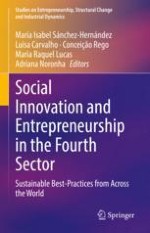2021 | Buch
Social Innovation and Entrepreneurship in the Fourth Sector
Sustainable Best-Practices from Across the World
herausgegeben von: Dr. María Isabel Sánchez-Hernández, Prof. Luísa Carvalho, Prof. Conceição Rego, Prof. Maria Raquel Lucas, Prof. Adriana Noronha
Verlag: Springer International Publishing
Buchreihe : Studies on Entrepreneurship, Structural Change and Industrial Dynamics
